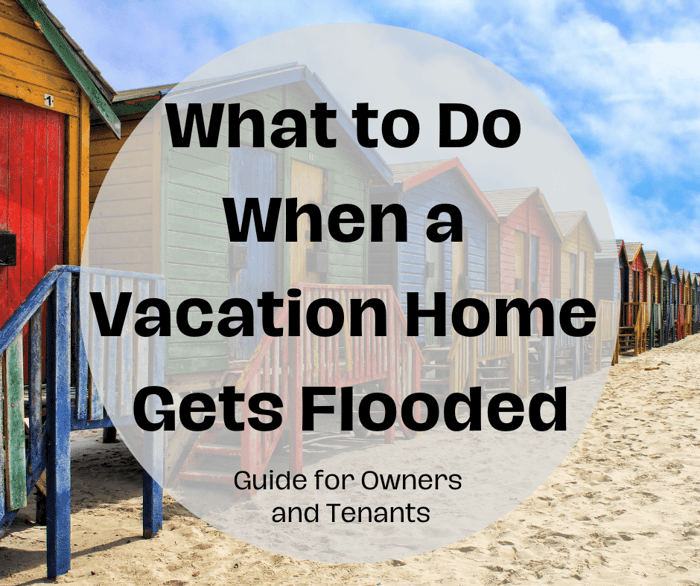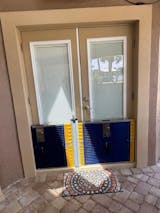Owning a vacation home is a dream come true for many of us. It’s a place to escape, relax, and make memories. But what happens when the unexpected strikes, like a flood?
When you have tenants in your vacation home and a flood occurs, the situation can become more complex. Here’s a step-by-step guide on what to do to ensure the safety of your tenants and manage the aftermath effectively.
Safety First!
Immediate Communication:
- Contact your tenants as soon as you learn about the flooding. Ensure they know their safety is the top priority.
- Advise them to avoid floodwaters, turn off electricity if safe, and move to higher ground if necessary.
Emergency Contacts:
- Provide them with local emergency contacts, including flood rescue services and emergency shelters.
Ensure Proper Evacuation
Evacuation Assistance:
- If the flooding is severe, assist in coordinating evacuation efforts. This might include arranging transportation to a safe location or helping them contact local authorities for evacuation assistance.
Alternative Accommodation:
- Help them find alternative accommodation. This could be another property you own, a nearby hotel, or a rental property. You might also cover the costs temporarily as a goodwill gesture.
Document the Damage
Tenant Reports:
- Ask your tenants to document the situation if it’s safe for them to do so. This includes taking photos and videos of the flooded areas and any damaged property.
Owner’s Documentation:
- If possible, visit the property to assess and document the damage yourself. If you can’t get there, consider hiring a local property manager or trusted neighbor to do it for you.
Contact Your Insurance Company
Notify Insurers:
- Inform your insurance company about the flood immediately. Provide them with all necessary documentation, including tenant reports, photos, and videos.
Claims Process:
- Follow the insurance company’s instructions for filing a claim. This may include detailed lists of damaged items and repairs needed.
Arrange for Professional cleaning
Hire Experts:
- Engage professional cleanup and restoration services to handle the flood damage. This ensures that the property is thoroughly cleaned, dried, and treated for mold.
Safety First:
- Make sure the cleanup crew is licensed and experienced in dealing with flood damage to ensure they follow safety protocols and proper procedures.
Communicate with Tenants About Repairs
Transparency:
- Keep your tenants informed about the cleanup and repair timeline. Let them know what steps are being taken and when they can expect to return, if applicable.
Temporary Relocation:
- If repairs will take a significant amount of time, discuss temporary relocation options with your tenants. Be clear about what expenses you’ll cover and the expected duration.
Review the lease agreement and Legal Obligations
Lease Terms:
- Review your lease agreement to understand your legal obligations regarding natural disasters and tenant relocation.
Legal Advice:
- Consider consulting a legal professional to ensure you’re fulfilling your responsibilities and protecting your interests.
Plan for Future Prevention
Flood Protection Measures:
- After the immediate crisis is handled, consider investing in flood protection measures. This could include installing flood barriers, improving drainage, and reinforcing the property’s structure.
Flood Barrier Door Dam - Ultimate Flood Gate

$949.00
DAM EASY® FLOOD GATE - DOOR DAM Floods are becoming more common around the world. What was once a 100-year phenomenon is now a seasonal trend that homeowners must deal with. That’s EXACTLY why you need this Dam Easy Flood… Read More
Insurance Review:
- Evaluate your current insurance policy to ensure it provides adequate coverage for flood damage. Consider adding additional coverage if necessary.
Maintain Open Communication
Tenant Relations:
- Maintain open and empathetic communication with your tenants throughout the process. Understand their concerns and be responsive to their needs.
Regular Updates:
- Provide regular updates on the status of repairs and any developments related to the flood and its aftermath.
Reflect and Learn
Post-Incident Review:
- After the situation is resolved, reflect on what worked well and what could be improved. Use this experience to enhance your emergency preparedness plans for the future.
Feedback from Tenants:
- Seek feedback from your tenants about how the situation was handled and what could be improved. This can help build a stronger landlord-tenant relationship and improve your response to future emergencies.
By taking these steps, you can effectively manage a flood situation in your vacation home while ensuring the safety and well-being of your tenants. Being proactive, communicative, and empathetic can make a challenging situation more manageable for everyone involved.
What if I am the tenant of the flooded vacation house?
Imagine you're enjoying a peaceful getaway at a charming vacation home when suddenly, the weather takes a turn for the worse. Rain starts pouring, and before you know it, water begins to seep in. Here’s what to do if you find yourself in this situation:.
1. Prioritize Your Safety
Your safety comes first. Avoid contact with floodwaters, as they can be dangerous and contaminated. If the water is rising quickly, move to higher ground immediately.
2. Contact the Homeowner
Inform the homeowner about the situation as soon as possible. They need to be aware of the flooding to take necessary actions, including contacting their insurance company and arranging for cleanup and repairs.
3. Turn Off Utilities
If it’s safe to do so, turn off the electricity, gas, and water to prevent further damage and potential hazards like electrocution or gas leaks.
4. Document the Situation
Take photos and videos of the flooding and any damage. This will help the homeowner with their insurance claims and repairs.
5. Move Valuables to Safety
If you can, move valuable items to a higher location within the house to prevent them from getting damaged. This includes electronics, important documents, and personal belongings.
6. Avoid Using Tap Water
Flooding can contaminate the water supply, so avoid using tap water for drinking, cooking, or cleaning until it’s deemed safe.
7. Seek Shelter Elsewhere
If the flooding is severe, find a safe place to stay. Contact local authorities for information on emergency shelters or nearby accommodations.
8. Follow Local News and Alerts
Stay informed about the situation by following local news and weather alerts. This will help you understand the extent of the flooding and any emergency measures in place.
9. Cooperate with Cleanup Efforts
Once the floodwaters recede, cooperate with any cleanup efforts. This might include helping the homeowner by moving items, cleaning, or arranging for professional help.
10. Reflect and Prepare for Future Incidents
Experiencing a flood can be a wake-up call. If you plan on staying in vacation homes frequently, consider purchasing travel insurance that covers natural disasters and familiarizing yourself with flood safety tips.
Flooding can be a stressful and overwhelming experience, but with the right steps, you can ensure safety and minimize damage. Whether you own the vacation home or are simply staying there, being prepared and acting quickly can make all the difference. Stay safe and take care!




















